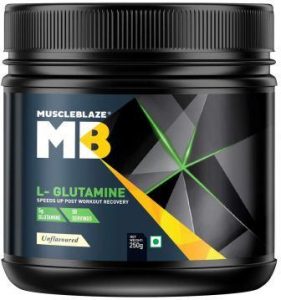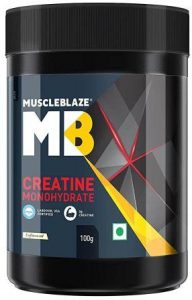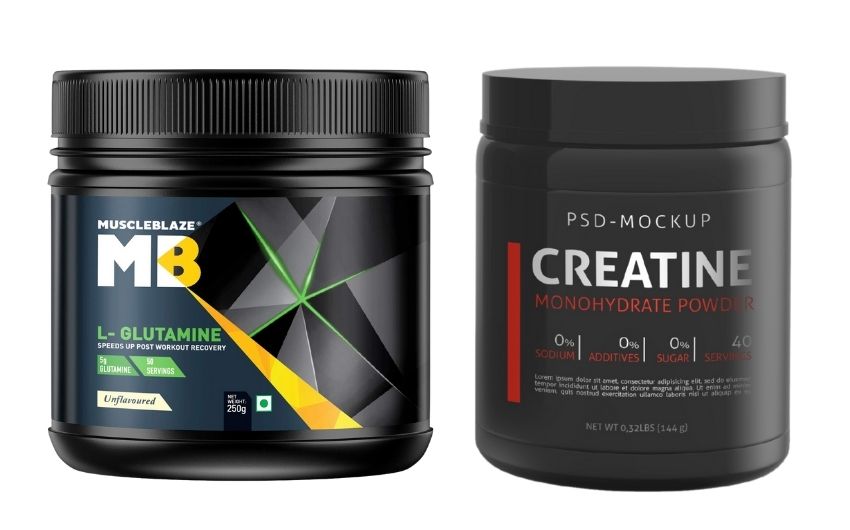Sport and exercise supplements are available in so many varieties that choosing the right one can be confusing. The question of which is the most effective sports supplement for muscle building generally comes down to glutamine versus creatine.
The presence of glutamine and creatine can be found in a wide variety of protein powders and supplements. The truth is a large portion of people do not understand the difference between creatine and glutamine. Although both are effective for building strength and lean muscle, choosing the one that will work best for you remains a tough task.
Before making a choice between glutamine and creatine, one must first understand the science behind both. Is glutamate exactly what it sounds like? What is the source of creatine? The human body depends on these things. What role do they play? How does glutamine compare to creatine?
We will take you through glutamine vs creatine to help you understand what you need to do to get the best results from your workout.
Glutamine

The amino acid glutamine is an important component of proteins. A protein’s tasks include forming muscles, transporting essential substances through the blood, and assisting the immune system. Glutamine is an essential amino acid for maintaining your health.
Amino acids are commonly found in two forms. This group includes glutamine, an amino acid. Glutamine comes in various modes, including L-glutamine and D-glutamine. Despite their similar appearances, the two forms of glutamine work differently in the body because of their different molecular structures.
L-glutamine is commonly listed as glutamate in foods and supplements, but we can also find it in foods and supplements as L-glutamine. To build proteins, L-glutamine is necessary. Our bodies generate many amino acids from this molecule.
Our bodies can produce L-glutamine in large quantities, but sometimes the substance is needed in higher quantities, which means it needs to be derived from food or another source, such as a supplement. During injury and illness, we may require a greater amount of L-glutamine than we need for everyday functioning. This biochemical process led to the development of glutamine, which is a supplement for athletes.
Are Creatine’s benefits so great?

A typical creatine molecule consists of arginine, glycine, and methionine. Amino acid derivatives form this chemical compound. Produced by the kidneys, liver, and pancreas, it is essential for human health. In addition to food sources like red meat, we can also get creatine from supplements. The body relies primarily on skeletal muscle to store this substance as a naturally occurring chemical tissue. As soon as it is stored in biological cells, it turns into phosphocreatine and is stored for later use. As free creatine, a small portion of the creatine produced by the body and ingested by the diet circulates.
As creatine supplements aid in developing muscle, they have become increasingly popular among athletes. Athletes have shown the effects of taking creatine supplements on muscle mass and strength in scientific studies. Study results also indicated that athletes taking creatine supplements performed as well as 43 percent better than their control group. In addition to increasing strength, creatine also enhances overall performance.
Creatine VS Glutamine
Both glutamine and creatine are natural organic compounds synthesized by the human body. Transport and storage are both carried out by muscles. The liver and kidneys produce creatine as a sequence of amino acid synthesis.The human body produces twenty amino acids, among them glutamine.
One of the major differences is that creatine has a role in metabolism, which enhances muscle growth. Meanwhile, glutamine is included in the system of compounds that helps muscle protein synthesis.
We normally obtain creatine through our bodies’ normal metabolic function, but some people may need supplements, such as those who have been injured, are recovering from illness, or had surgery. Creatine supplements, however, can be an effective addition to workout supplements since they support muscle growth.
Amino acids with a conditionally essential status, such as glutamine, are needed in limited amounts. Therefore, glutamine must be acquired through diet. Since glutamine is directly involved in muscle protein synthesis, some athletes prefer it. Other people use creatine, which facilitates muscle protein synthesis through metabolic processes.
You can build muscle by consuming glutamine. Taking creatine will boost your muscle-building efforts. The two are therefore very different because of this.
Taking glutamine at the right time

To increase the ability of glutamine to increase HGH and its effects after exercising, we should take it immediately after working out. In the post-workout phase, you can enhance muscle synthesis by increasing levels of HGH. Additionally, this reduces body fat and increases metabolic activity.
Furthermore, glutamine tends to suppress insulin levels, so taking it after exercising is also beneficial. For people suffering from diabetes or blood sugar problems, this is fantastic. However, this also leads to increased muscle and decreased body fat.
Creatine: when should you take it
We normally take creatine before working out, according to conventional wisdom. As a pre-workout supplement, creatine will increase glycogen levels and sustain energy for highly intense training. Once you have finished exercising, it also helps to recover your muscles.
Despite this, research on creatine appears to suggest that you can take it just before or just after exercise, but you should only take it before or immediately following that. Your workout should be as close as possible to your workout. Creatine supplements taken before workouts have been shown to build muscle much more quickly than those taken hours after a workout.
Glutamine’s health benefits

Taking glutamine results in muscle gains for most people. The amino acid glutamine is essential for the development of muscle tissue. It is essential to ensure that your body has the amino acids it needs before working out to maximize your workout’s benefits. Those who took glutamine supplements had six times more muscle gain than those who did not take the supplements, according to a study that tracked the impact of glutamine supplements on people who did high-intensity muscle training.
Clinical studies have shown that glutamine can also reduce muscular fatigue and soreness from intense exercise. The results of one study found that people who took glutamine supplements experienced less muscle fatigue and soreness for up to two hours longer than those who did not.
Other benefits of glutamine include:
Immune System

It is clear how much of benefit glutamine can be to the immune system since it is already prescribed for medical purposes. A critical component of the immune system, glutamine is an essential fuel for immune cells such as white blood cells.
It is common to have a depleted immune system when we are ill or injured. An immune system that is weakened by burns is especially vulnerable. It follows that glutamine production will be insufficient to meet the body’s glutamine needs. To obtain more glutamine, the body may break down muscle tissue. There may be a need for supplements that contain glutamine in this situation.
In such conditions, glutamine supplements can promote the immune system. Glutamine supplements have been shown to reduce infections and hospital stay in critical illness and trauma.
Antimicrobial and antiviral properties have also been linked to glutamine-containing supplements.
Intestinal well being
Because glutamine contributes to gut health, it is beneficial for the immune system. The intestines are responsible for maintaining health due to their role in the immune system. The immune system is primarily composed of intestinal cells. The immune system relies on glutamine as its chief source of nutrition.
Intestinal walls contain cells that inhibit bacteria from penetrating the body and producing serious infections. Further, it prevents toxins from entering the body because it forms a barrier. This process requires that your body receive a constant supply of glutamine. As a result of glutamine’s positive effects on the intestinal system, the immune system is also strengthened.
Glutamine also plays a major role in aiding:
- Reduces the breakdown of muscle mass
- They initiate the muscle protein synthesis process
- Enhances recovery time
- Lessens soreness in muscles
- Enhances immunity
- Healthier Digestive System
- Improves symptoms of inflammatory bowel disease
Benefits of Creatine
The use of creatine as an exercise supplement has been extensively studied by scientists. Scientists have proven scientifically that creatine has its benefits rather than being anecdotal. Adding creatine to your workout supplement regimen has several benefits.
Cells produce more energy
Phosphocreatine is more abundant in cells that contain creatine. At the cellular level, phosphocreatine stored in the cells helps to generate energy. By producing ATP, it produces energy through the breakdown of chemical bonds during exercise. Our cells use ATP as their primary energy source. As a fundamental energy builder and stimulant, creatine is highly beneficial.
We can build muscle mass with creatine
Creatine helps stimulate the growth of new muscles by opening cellular pathways. Additionally, it contributes to the building of muscle tissue by forming complex proteins.
Performance during high-intensity training is improved
Studies have shown that creatine enhances stamina and endurance. It is known that supplementing with creatine can increase endurance by increasing strength, reducing fatigue, increasing muscle mass, improving recovery, and even improving brain function.
It accelerates the growth of muscles
Creatine can accelerate muscle growth. Although athletes are aware of this fact, scientific evidence also backs it up. Supplementing with creatine has been shown to increase muscle growth, with significant increases being seen within five days.
Diabetics may benefit from creatine’s ability to lower blood sugar levels
High-intensity exercise combined with creatine supplementation is known to lower blood sugar levels. Creatine can reduce blood sugar spikes in the short run, resulting in lower blood sugar in the long run.
It stimulated brain cells
ATP, the energy-producing molecule produced by cells, is increased by creatine. It enhances your brain’s performance just like it does your muscles. Researchers have found that creatine improves brain function. These are natural remedies that can assist in treating diseases such as Alzheimer’s and Parkinson’s.
Furthermore, creatine may be able to prevent strokes and epileptic seizures.
- Enhances muscle mass and strength
- Enhances the recovery process
- Improves Speed and Sprint Performance
- Optimizes the functioning of the brain
- Endurance is improved
- Sports Performance Is Improved
Supplements made of Glutamine and Creatine
Glutamate and creatine are available in several supplements. There are many reputable products available on the market, and solid science backs glutamine and creatine up. You do not need to worry about risks if you purchase from a reputable provider.
When taken within the guidelines provided by the companies, glutamine and creatine are safe to take.
The Suggested Dose of Glutamine and Creatine
To facilitate exercise recovery and training, studies suggest a dose of 5 g of glutamine for performance benefits. It is recommended that you take 15-20 g a day for digestive health and gut health.
We should take creatine for at least 10 days at a dose of 10-15 grams. Creatine supplementation supports anaerobic training capacity and performance improvements by boosting muscle creatine and phosphocreatine levels by 15-40%. Because of the optimal absorption rate and bioavailability, some creatine supplements require only three grams and do not require a loading phase.
Takeaway
Strength, power, and recovery can be greatly enhanced by taking both creatine and glutamine as part of an optimal training routine. With higher workout intensity or explosive movements, glutamine can provide the additional muscle fuel you need to power your performance.
Muscle soreness can profoundly affect performance gains and outcomes during training sessions. Training sessions are more productive, and workouts are better when recovery is better. Enhancing and optimizing your performance through supplements is possible.
Glutamine and creatine are two very different substances that serve several functions in the body. Research has shown creatine to produce a greater rate of muscle power and strength than glutamine, which helps muscles recover from exercise and increase muscle strength.


